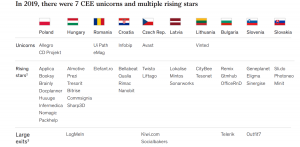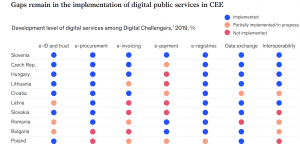The Digital Economy of CEE is Growing Twice as Faster in Times of Covid-19

‘Digitalization is the leverage that CEE countries can use to stay on their growth trajectory’ – this is the conclusion reached in a report of McKinsey&Company for 2018. Since then, the pace of digitalization of the so-called Digital Challengers, namely the ten CEE countries – Bulgaria, Croatia, the Czech Republic, Hungary, Latvia, Lithuania, Poland, Romania, Slovakia, and Slovenia has been steadily increasing. Even though in 2020 the Covid-19 outbreak has led to numerous uncertainties about the future, one thing is clear – the pandemic has accelerated the digital transformation of CEE countries as it has brought about the emergence of a “new normal” world that is more digital than ever.
To assess the progress that CEE countries have achieved in digitization and discuss the effects of the pandemic on digital economy growth, on 13th October 2020 McKinsey&Company released its special report “Digital Challengers in the next normal: Central and Eastern Europe on a path to digitally-led growth”. The report quantifies digitalization by measuring the value of the ICT sector, the value of the e-commerce market expressed as online sales, and the value of offline consumer spending on digital equipment such as computers, electronics, and in-home consumer electronics.
The engines driving digitalization in the CEE region
Three out of four people in CEE are now digitally engaged. The lockdown has drastically transformed the way people interact, travel, spend their leisure time, and use public services – almost 12 million new users of online services appeared in the CEE, 70% of whom have declared that they will stick to using digital services after the pandemic. McKinsey estimates that during the first five months of the pandemic, the digital economy of CEE countries grew almost twice faster than in the previous year, capturing 78% of the value growth of the digital economy in 2019, which equates to some €5.3b.
The report highlights that CEE countries are well-equipped to exploit this potential for faster digitalization as they have strong macroeconomic performance, a vibrant tech ecosystem, and a good-quality digital infrastructure. Along with the traditional levers that support digital growth in CEE, there are other aspects such as an accelerated flow of educated migrants and access to EU recovery and resilience funds. On the other hand, however, education is starting to lose edge as there has been a drop of STEM graduates between 2016 and 2018 and CEE is now outranked by the UK, France,and Germany in terms of share of population.
More about the vibrant technology ecosystem of the CEE
The findings of the report imply that a number of clusters for gaming, cybersecurity, and fintech with a mark on the global tech stage are becoming apparent in the CEE. For example, the Polish video game developer CD Projekt Red has become the biggest gaming studio in Europe, while in cybersecurity, the two top companies in the region – the Czech Avast, the Slovak ESET together have more than one billion users globally. Lithuania is the largest fintech hub of the region with more than 210 companies in 2019. Moreover, as the graphic below illustrates, 2019 has been an eventful year for the CEE region as it marked the development of seven unicorn companies and multiple rising stars, among which Bulgaria’s OfficeRnD and Gtmhub.

How should stakeholders act to accelerate digitally-led growth?
So, based on all of these insights, what are the recommendations and advice of McKinsey? The report concludes that in order to utilize the full capacity of the rising digital trend, all actors in the CEE region have to act, starting with each citizen who should take advantage of remote work models, engage in lifelong learning, and invest in digital skills. Businesses are advised to adjust their business models for accelerated digital adoption by increasing their operational efficiency. Put in other words, companies should prepare to develop new and optimize existing digital offerings and channels, start consistently using data analytics and AI, and improve their IT infrastructure. On the level of the public sector, McKinsey recommends for the establishment of a CEE Digital Council with the main goals of building a harmonized digital business environment and encouraging best-practice sharing. Moreover, CEE public authorities should focus on adjusting school curricula, promoting lifelong learning, and leveraging net positive migration as a source of talent. As seen in the graphic below, there are still gaps, which need to be closed when it comes to the digitalization of public services in the CEE countries. Even though all of them have implemented digital services, or are in the process of doing so, Slovenia, the Czech Republic, and Hungary are ahead of the process, while Bulgaria, Romania, and Poland still have a long way to go. E-payments, E-invoices, and the interoperability of data they gather are the three elements that CEE countries seem to struggle the most with.





























